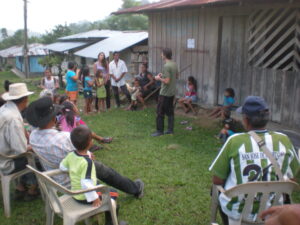Certificate in Participatory Research
The Graduate Certificate in Participatory Research (GCPR) is an interdisciplinary certificate program for graduate students at UNC-Chapel Hill seeking training in the theoretical bases, rationale, methodologies, challenges, and motivations for carrying out research in equitable partnership with (not on) communities.
For an overview of the GCPR program, please browse this website and view the following presentation: Overview of the UNC Graduate Certificate in Participatory Research
To apply for admission to the Certificate, please submit your Application Form and a 1-2 page statement of background and interest to participatoryresearch@unc.edu. Materials are due by May 1 and December 1, and applicants will be notified of admission in May and December of each year.
Community Based Research and Anti-Racism
The Graduate Certificate in Participatory Research as a community of faculty, students, and community partners, is always committed to conducting our research and partnerships in the spirit of advancing equity. As recent events renew energies around the work of anti-racism in the United States and the world, we would like to offer resources for those looking to intersect their research with activism, or simply looking for personal edification on issues of antiracism. Community based participatory research is grounded in principles of service, partnership, and equal value of all epistemologies that support equity work. We believe that engaging in antiracism work is essential for competence in this research. Please see below a non-exhaustive list of recommended resources:
- Racial Equity Institute is an ‘alliance of trainers, organizers, and institutional leaders who have devoted themselves to the work of creating racially equitable organizations and systems.’ We recommend enlisting in their trainings for in depth analysis of institutional racism in the United States.
- The NYT 1619 Podcast is a wonderful resource for understanding the history of the United States within the important context of the slave trade that shaped it.
- How to Be an Antiracist by Ibram X. Kendi takes readers through a widening circle of antiracist ideas—from the most basic concepts to visionary possibilities—that will help readers see all forms of racism clearly, understand their poisonous consequences, and work to oppose them in our systems and in ourselves.
- TEDTalk: Allegories on Race and Racism is a 20 minute speech by Dr. Camara Phyllis Jones explaining her revolutionary allegory to understand the different levels of racism and their impacts on our society.
- The Case for Reparations by Ta-Nehisi Coates is an article in the Atlantic by New York Times Best Selling author Ta-Nehisi Coates that provides both an in depth analysis of race in the United States as well as suggestions for moving forward.
- Why are all the Black Kids Sitting Together in the Cafeteria by Beverly Tatum is a a NYT Best Seller that discusses the psychology of racism and how to communicate across racial and ethnic divides.
- White Fragility by Robin DeAngelo is a must for White allies looking to engage in anti-racist work. This book is helpful in increasing self-awareness and learning the importance of understanding our world as racially socialized.
Please note that there is a Graduate Certificate in Qualitative Studies currently housed in the School of Education. These are complementary but not overlapping certificates. For information about the Graduate Certificate in Qualitative Studies (GCQS), please contact Dr. Sherick Hughes, Professor of Education and Founder and Director of the GCQS Program (shughes@email.unc.edu), or visit their website at https://ed.unc.edu/academics/programs/graduate-certificate-in-qualitative-studies/.

